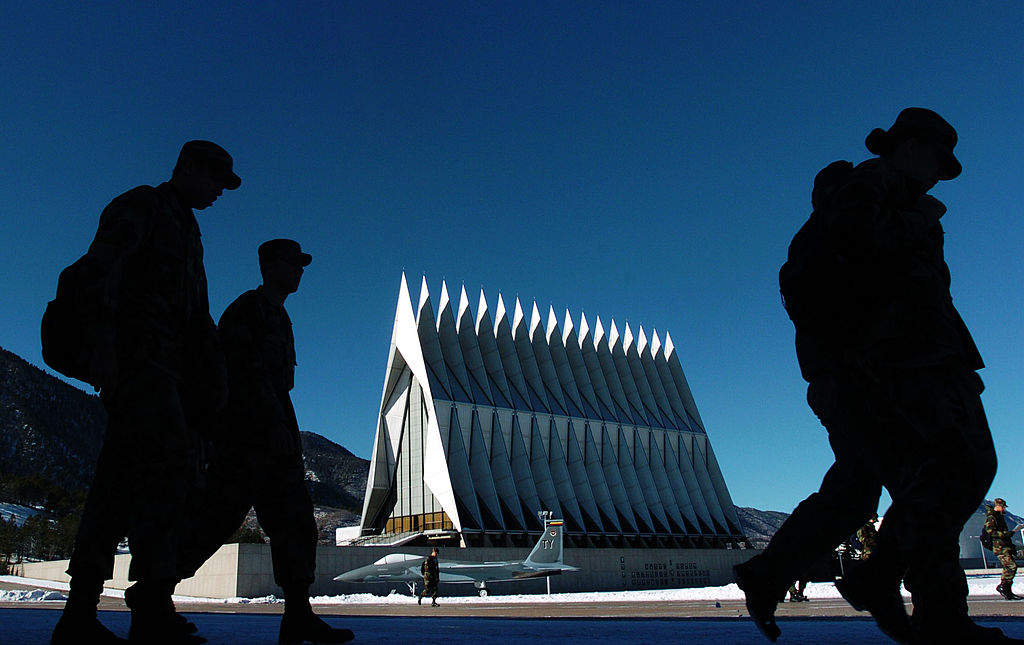West Point, Air Force Academy Eliminate Affirmative Action
 Credit: Glenn Asakawa / The Denver Post / Getty Images
Credit: Glenn Asakawa / The Denver Post / Getty Images- The U.S. Military Academy and Air Force Academy will no longer consider race in admissions.
- These decisions follow a directive from the Trump administration banning DEI activities within the Defense Department.
- Earlier this year, the U.S. Naval Academy similarly abandoned affirmative action.
- Changes to admissions policies should end lawsuits against the academies brought by Students for Fair Admissions.
In moves that should surprise no one, the U.S. Military Academy (West Point) and the U.S. Air Force Academy have abolished race-conscious admissions.
Recent court filings documenting changes to admissions policies come only a few weeks after the U.S. Naval Academy filed a similar motion.
The three military academies have abandoned affirmative action to obey a directive from Secretary of Defense Pete Hegseth.
His Jan. 29 memo stated that the Defense Department will “strive to provide merit-based, color-blind, equal opportunities to service members” and that no department members, including service academies, could “establish sex-based, race-based, or ethnicity-based goals for organizational composition, academic admission, or career fields.”
Hegseth’s directive followed President Donald Trump’s Jan. 27 executive order calling for the “elimination of race-based and sex-based discrimination within the Armed Forces of the United States” as part of a broader agenda to eliminate diversity, equity, and inclusion (DEI) policies writ large.
Want to learn more about going to college during and after military service? Read more:
The military academies’ adherence to these orders was evident in court documents submitted as part of ongoing cases brought by Students for Fair Admissions (SFFA), the group that prevailed in the 2023 landmark U.S. Supreme Court decision banning race-conscious admissions.
In his majority opinion in that case, SFFA v. Harvard, Chief Justice John Roberts included a brief footnote exempting the nation’s military academies from the ruling “in light of the potentially distinct interests [they] may present.”
Despite this exemption, or perhaps because of it, SFFA brought suits against all three military academies, aiming to prevent these institutions from considering race in admissions.
The Trump administration’s directives came as all three lawsuits worked their way through the courts. Last December, a district judge ruled that the Naval Academy could continue considering race in admissions given morale concerns and national security interests.
Yet the elimination of race-conscious admissions now renders the three lawsuits moot, the military academies argue.
On April 11, the Air Force Academy filed a consent motion in the Colorado district court requesting an abeyance as both parties reevaluate the case in light of the academy’s new policy. The motion declared that “the Air Force Academy no longer permits any consideration of race, ethnicity, or sex in the admissions process.”
That same day, the Justice Department submitted a similar request to a district judge in New York stating that “race and ethnicity are no longer factors in [West Point’s] admissions process.”
These motions should effectively end the lawsuits. The question now pertains to the future diversity, or lack thereof, among military officers, many of whom earn commissions after attending the nation’s military academies.
In his opinion in the Naval Academy case, District Judge Richard Bennett offered a lengthy discussion of the issue of race in the military, citing historical examples of how racial imbalance in the various service branches, especially a lack of Black representation within the officer corps, caused unrest and disloyalty among the troops.
“The military’s history of racial discrimination and racial tensions, and resulting ‘lack of unit cohesion,’ ‘lack of trust,’ and ‘diminish[ed] … capability,’ directly informed the military’s judgment about the critical need for diversity in the armed forces generally and in the officer corps more specifically,” he wrote.
Although it likely will take years to determine the downstream effects of ending affirmative action at the nation’s military academies, the past may provide a glimpse of what the future holds.